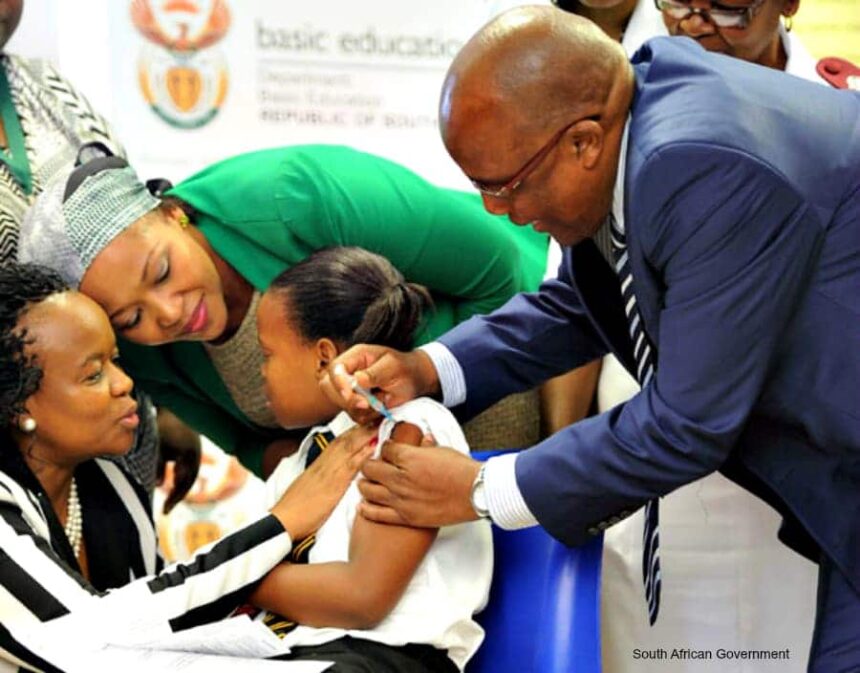Low screening coverage, late diagnoses, high HIV prevalence, and limited access to treatment and vaccines are driving cervical cancer cases and deaths in South Africa.
The country has a cervical cancer rate of between 22.8 and 27 per 100,000 women, much higher than the global average of 15.8 per 100,000. It is the leading cause of cancer deaths among women in South Africa. Each year, over 10,700 women receive a cervical cancer diagnosis, and more than 5,800 lose their lives to it.
Women with HIV are six times more likely to develop cervical cancer than those who are HIV-negative. Because HIV weakens the immune system, it becomes more difficult for the body to clear Human Papillomavirus (HPV) infections, the virus that causes cervical cancer. As a result, these infections tend to persist longer and are more likely to progress to precancerous lesions and, ultimately, cervical cancer.
According to Dr. Mark Faesen, a gynaecologist and fertility expert from the Clinical HIV Research Unit (CHRU), HPV is the most common sexually transmitted infection; over half of young people get infected within three years of being sexually active.
“There are nearly 150 HPV types, but not all pose the same level of threat. Close to 80% of all cervical cancer cases are linked to one or a mix of three high-risk types, which include HPV 16, 18, and 45,” he says.
He says once it becomes a persistent infection, it stays in the body for life. The virus cannot be removed, and continued infection with high-risk HPV strains will cause cervical cancer. The damage doesn’t stop at the cervix; areas such as the vulva can also develop ongoing infections.
“The biggest risks tied to lasting HPV infection include weak immunity when HIV isn’t well-managed, having multiple sexual partners, repeated exposure to the virus, co-infection with other STIs, and smoking,” Faesen says.
Drive to prevention
But cervical cancer is preventable. Vaccines are highly effective in preventing HPV. The World Health Organisation recommends vaccination for HPV vaccination, especially for girls aged nine to 14, before they become sexually active. The organisation also advises vaccination for girls and young women up to the age of 20. For those over the age of 20, two doses administered six months apart are recommended.
HPV vaccination was introduced in South African schools in 2014 for girls who are nine years and older, before they become sexually active. Faesen says delivering vaccines to every child who needs them remains challenging. He says there is a challenge to reach all eligible children due to logistical issues.
Professor Sinead Delany-Moretlwe, who leads research at Wits Reproductive Health & HIV Institute (Wits RHI), says while the HPV vaccination efforts have made strides, key parts of the overall approach still lack strength.
“Getting women screened, tested, and treated remains a big problem. Many steps are involved, and people often don’t return for follow-ups,” Delany-Moretlwe says.
HPV screening involves testing for the presence of high-risk types of HPV that can lead to cervical cancer. It is usually done using a sample of cells collected from the cervix, either through a Pap smear or a dedicated HPV test. But unlike Pap smears, which look for abnormal cells, HPV tests detect the virus itself, often identifying risk earlier and more accurately.
“Many women, especially those living with HIV, don’t realise their cervical cancer risk and avoid getting Pap smears. Overworked health workers at many clinics also struggle to focus on cervical screening because they deal with so many other medical problems,” Faesen says.
Faesen says that while urban clinics manage patient referrals, rural healthcare systems face significant obstacles.
“The system to refer women with abnormal Pap smears is under heavy strain in rural regions. Challenges include far distances, poor infrastructure, and not enough resources,” he says.
Salome Meyer, who leads the Cancer Alliance, of cancer-focused organisations and advocates, says one major issue is that the cervical cancer screening system relies on women visiting primary healthcare clinics on their own.
“There are no large-scale screening efforts. Everything depends on whether a woman decides to go to a clinic. With this system too many women get missed,” she says.
She explains the current cervical screening programme covers just 57% of eligible women. This falls far below the 70% required to meet the WHO 2030 cervical cancer elimination target.
Urgent steps required
To reduce cervical cancer mortality in South Africa, Faesen says there is a need for increased awareness and a strengthened health system.
“We need to raise awareness across the entire population, improve referral pathways, increase the number of referral centres, and expand their capacity,” he says.
He says this will enable early detection and allow for treatment in the pre-malignant stage before cancer has a chance to develop.
The Importance of Regular Exercise for Mental Health
Exercise is not only important for physical health, but it also plays a crucial role in maintaining and improving mental health. Regular physical activity has been proven to have numerous benefits for mental well-being, including reducing symptoms of anxiety and depression, improving mood, and enhancing cognitive function.
One of the key ways in which exercise benefits mental health is by releasing endorphins, often referred to as the “feel-good” hormones. Endorphins are neurotransmitters that act as natural painkillers and mood elevators, leading to feelings of euphoria and well-being. When we engage in physical activity, our bodies release endorphins, which can help alleviate symptoms of stress, anxiety, and depression.
Additionally, exercise has been shown to reduce levels of cortisol, the stress hormone, in the body. High levels of cortisol can contribute to feelings of anxiety and depression, so by engaging in regular exercise, individuals can help lower their cortisol levels and improve their overall mental health.
Furthermore, physical activity can improve cognitive function and enhance memory and learning abilities. Exercise increases blood flow to the brain, which helps deliver oxygen and nutrients to brain cells, promoting neuroplasticity and the formation of new neural connections. This can result in improved focus, concentration, and mental clarity.
In addition to the physiological benefits, exercise can also have social and emotional benefits for mental health. Engaging in physical activity can provide opportunities for social interaction and connection, which can help combat feelings of isolation and loneliness. Exercise can also serve as a form of self-care and self-expression, allowing individuals to take time for themselves and engage in activities that bring them joy and fulfillment.
Overall, incorporating regular exercise into your routine can have a significant impact on your mental health and well-being. Whether it’s going for a walk, taking a yoga class, or lifting weights at the gym, finding an activity that you enjoy and that fits your lifestyle is key. By prioritizing physical activity and making it a regular part of your routine, you can reap the many benefits that exercise has to offer for your mental health.








